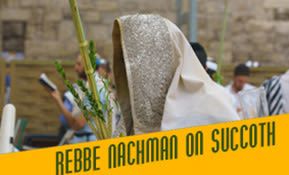
A Tremendous Difference
He began to speak in a very loud voice, in public places, about the wickedness of Stalin himself. When the police heard about this behavior...

A Tremendous Difference
We must remember that there is a tremendous difference between the mitzvot a person does on his own initiative and those he does in response to outside influences. For example, if someone lives in a community in which everyone is doing mitzvot – praying, studying Torah, building sukkot, putting mezuzot on their doorways – it is relatively easy for him to do the same. He gets a “boost” from his environment which is like “an awakening from above”. But if someone lives in a non-religious environment, he has to fight against the prevailing attitudes and influences in order to do mitzvot. When he serves God without any special assistance from heaven or from his environment, he makes “an awakening from below” that is very precious to God. Every mitzvah is valuable, but a mitzvah that is motivated by such an “awakening from below” is inestimable more precious.
(Nevertheless, when a person has a choice, it is generally preferable to live in a religious environment, as we see from Rabbi Yossi ben Kismah’s statement in the Mishnah, “Even if you were to give me all the treasure of the world, I would only agree to live in a place of Torah” (Pirkei Avot 6:10). However, the very fact that a person chooses such an environment can be considered a kind of “awakening from below,” especially when it involves a financial sacrifice or some other difficulty.)
Taking the Initiative
There once lived in Jerusalem a very special man named Rabbi Aharon Rabinowitz. He was a Lubavitcher Chassid who had escaped from Russia during the terrible years of the Stalinist regime – a feat that was virtually impossible at the time. One motzei Shabbat, he walked into the Breslov synagogue in Jerusalem with a large box of food and drink and invited everyone to join him in celebrating the anniversary of his escape from Russia.
During the course of the meal, he told us the wondrous story of his escape. The Stalinist regime had spies everywhere and ordinary citizens lived in constant dread. No one dared speak a word against the government, even in a private, for fear of being arrested as a subversive – a charge that was generally punishable by Siberian exile, and sometimes by execution.
Reb Aharon, however, had a bizarre idea, and with God’s help, it worked. He began to speak in a very loud voice, in public places, about the wickedness of Stalin himself. When the police heard about this behavior, they could draw only one conclusion: this man was not a subversive, he was insane! Why else would anyone do such a thing? And since they decided he was insane, they decided to throw him out of Russia, and he eventually made his way to Israel.
Before he left Russia, however, he had to spend a few days in Moscow to make sure his papers were in order. The problem was that there was absolutely no place for him to stay. Everyone was afraid to invite him into their homes, since their names would end up on the government’s “blacklist,” and that could lead to the worst things. Finally one Jew had the courage to let him in, and “Umaner Chassid,” as they used to call the Breslover Chassidim in Russia.
Just before Reb Aharon left Moscow, his host said to him, “I know you are a Lubavitcher Chassid, and you will pray with the Lubavitcher Chassidim when you get to Israel. Nevertheless, I would like to ask you to go into the Breslover synagogue in Jerusalem at least once.”
“And this is the time!” Reb Aharon announced. Although he had been on his way to the nearby Lubavitcher shul for his yearly celebration, when he heard the sound of the melaveh malkah songs in the Breslover shul, he decided that it would be a good time to fulfill his promise to the “Umaner Chassid” in Moscow who had helped him.
Amidst the songs and words of Torah, Reb Aharon told us the following story he had heard in Russia. Before the communist revolution, in one of the cities of Russia, there lived a simple Jew, a blacksmith by trade, who began to gain a reputation as a miracle worker. When someone came to him for advice, he would open the Book of Psalms at random and think about the words for a moment. Then he would give the person an answer that addressed the problem with amazing acuity. Before long, people started flocking to him, for they saw that his blessings and predictions always came true. But no one could explain why such a simple Jew had been granted such an extraordinary gift from God.
One of the Chasidic rebbes heard about this remarkable phenomenon and traveled to see the man. The rebbe stayed in the blacksmith’s house for two weeks and watched him carefully, hoping to discover the secret of his inspiration. In the end, however, all he could say was that the blacksmith was not one of the hidden Tzaddikim, and that he did not seem to have any special characteristics. He was definitely a good Jew, a simple man who worked hard for his living and even set aside regular times for Torah study, but there wasn’t anything to explain why he had been granted such a remarkable gift. The rebbe’s opinion was that the blacksmith must have done a very special mitzvah in the past, one that caused a great “awakening” in the higher worlds, and for this he was granted a heavenly gift that all his words would be fulfilled.
An Initiative from Below – Blessings from Above
However, there is still something mysterious about this story. If the blacksmith was being rewarded for a very special mitzvah, why couldn’t anyone remember this mitzvah? Perhaps we can explain as follows.
There are a number of places in the Talmud where different scholars were asked: “What did you do to merit such a long life?” Their answer was that they were always careful about a particular mitzvah or character trait (for example: Megillah 27b, 28a). And yet, it would seem that there were other individuals who were just as careful about these things, and they never received such a reward. Hence some have suggested that these scholars did their particular mitzvot with a greater degree of perfection, or at a special time for Divine favor.
There is another possibility, however. As we have said, a mitzvah that a person does on his own initiative, without the benefit of an “awakening from above,” is very precious in the eyes of heaven. Since the motivation for such a mitzvah is truly from the person himself, the mitzvah itself is also considered to be his own accomplishment, so he receives a much greater reward for it. Perhaps the particular mitzvot mentioned by each scholar were mitzvot that they did without any “awakening from above,” and hence these mitzvot led to an extraordinary reward. In the same way, it could be that the blacksmith’s mitzvot were indistinguishable – to an outside observer – from other people’s mitzvot. But in truth – and this was something that others could not see – the motivation for these mitzvot was entirely his own, and hence he received an extraordinary reward from heaven.
Our Sages discuss this idea in connection with the verse: “And a mist rose up from the earth, to water the face of the ground” (Bereishit 2:6). They explain that the “mist” refers to the sighs that come from a Jew’s heart when he feels a powerful longing for his Father in heaven (Talmud Yerushalmi, Ta’anit 2:1). When such sighs “rise up from the earth,” they have a power to “water the face of the ground” – in other words, to draw down a blessing from heaven. Precisely when a Jew’s yearning for God comes “from the earth” – when it represents “an awakening from below” – then it has a tremendous power to draw down blessings from above.
Rebbe Nachman also mentions this in connection with the Mishnah (Sukkah 11a) that states: “When we make the roof of a sukkah, we may use only a material that is not susceptible to impurity (tumah) and that grows from the ground.” The word sukkah and the word schach (the material used for the roof of a sukkah) both allude to Divine inspiration (ruach hakodesh), since they are similar to the verb sacha, which means, “to see into the future.” Our Sages tell us, for example, that Sarah was called Yaskah because she saw (sachsah) things by means of Divine inspiration (Megillah 14a;Rashi s.v. “Yiskah,” on Bereishit 11:29. See also Vayikra Rabbah 8:3). Hence Rebbe Nachman reads this Mishnah as teaching that God only blesses a person with Divine inspiration when he is spiritually pure, and when his relationship to God “grows from the ground” – when he takes the initiative in coming closer to God and makes “an awakening from below” (Likutey Moharan I:21,3). Rebbe Nachman goes on to explain that Divine inspiration (ruach hakodesh) is a spirit of wisdom that descends from the Divine attribute of Chochmah (Wisdom) (The word kodesh can refer to the Sefirah of Chochmah. See Zohar 3:61). Yet it only rests upon a person who is already wise, as the verse says, “God gives wisdom to the wise” (Daniel 2:21).
It seems to me that the search for wisdom and the desire to acquire it are an essential aspect of wisdom, (Rabbeinu Yonah says this explicitly in his commentary on Pirkei Avot 4:1) as the verse says, “God looked down from the heavens at the people, to see if there was anyone who was wise, anyone who was searching for God” (Tehillim 14:2). Even the secular world knows this. The word “philosopher” is derived from two Greek words that mean “he who loves wisdom” – because wisdom and a love of wisdom are inseparable (See Sefer HaOruch, “philosopha.”). Only a person who loves wisdom will become wise, and a wise person loves wisdom.
Hence the verse says, “God gives wisdom to the wise” – to people who are already searching for God’s wisdom. This is an example of the more general idea we have discussed: When a person chooses something with a desire that is truly his own – with “an awakening form below” – he has a power to change all the heavenly worlds and to draw down tremendous blessings, so that even an ordinary person can receive wondrous gifts and rare spiritual powers.
To be continued…
(Excerpt from The Scent of Gan Eden, by Rabbi Yaakov Meir Shechter, Keren Ohr Publications. Used with author’s permission.)













Tell us what you think!
Thank you for your comment!
It will be published after approval by the Editor.